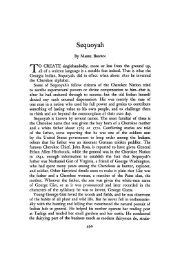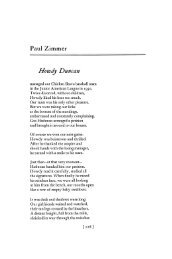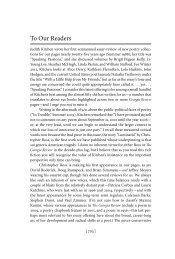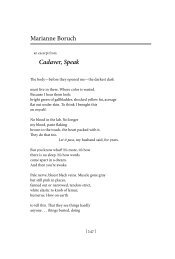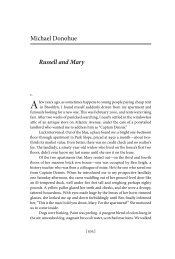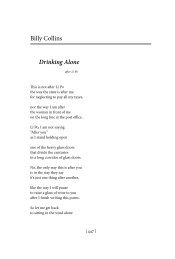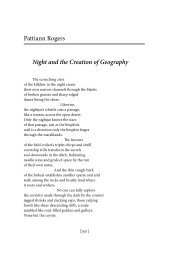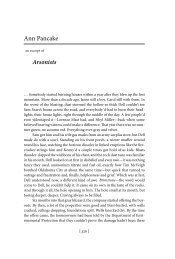Franz Schubert Dreamt of Indians - The Georgia Review
Franz Schubert Dreamt of Indians - The Georgia Review
Franz Schubert Dreamt of Indians - The Georgia Review
Create successful ePaper yourself
Turn your PDF publications into a flip-book with our unique Google optimized e-Paper software.
112 the georgia reviewRinna is treating me. If ever I take anything, I bring it up again atonce.Be so kind, then, as to assist me in this desperate situation bymeans <strong>of</strong> literature. Of Cooper’s I have read <strong>The</strong> Last <strong>of</strong> the Mohicans,<strong>The</strong> Spy, <strong>The</strong> Pilot, and <strong>The</strong> Pioneers. If by any chance you have anythingelse <strong>of</strong> his, I implore you to deposit it with Frau von Bogner atthe c<strong>of</strong>fee house for me. My brother, who is conscientiousness itself,will most faithfully pass it on to me. Or anything else.Your friend<strong>Schubert</strong>.He must have known then that he was dying. In fact, that seems to be the tacitpoint <strong>of</strong> the letter. Eleven days is an impossibly long time to subsist withoutfood or water. Even if he was exaggerating in a bid for sympathy, he must havebeen in bad shape, and the only thing he asked for—the novels <strong>of</strong> James FenimoreCooper—would not be much help. Seven days later, <strong>Schubert</strong> was dead.I became interested in <strong>Schubert</strong>’s music—falling in love with one particularpiano sonata, the B-flat major, or D960 according to the <strong>of</strong>ficial system forcataloging his works—when I was twenty-three. It happened one day whenI took my lunch break from my first, rather tedious job. I went out to find asandwich plus a pair <strong>of</strong> headphones and some kind <strong>of</strong> benign noise to blockout the chattering <strong>of</strong> my co-workers in adjacent cubicles. When I purchaseda recording <strong>of</strong> D960 performed by Alfred Brendel, I didn’t know anythingabout the sonata or about <strong>Schubert</strong>; it was just sitting there on a display rack<strong>of</strong> classical music near the register, and Brendel’s name was familiar to me. Idid not anticipate that the music I selected would become more distractingthan my colleagues’ nattering.<strong>The</strong> sonata is plaintive and insistent. I was arrested by it on first hearing,and this feeling was unfamiliar to me, though I have always been sensitive tomusic. Any <strong>of</strong> Beethoven’s odd-numbered symphonies can leave me verklempt,although that happens to a lot <strong>of</strong> people, I suppose. More embarrassingly, Ihave cried at a commercial (for what? financial services? tissues?) that incorporatedBarber’s “Adagio for Strings,” and I have surreptitiously dabbed away tearsat a high school band performance <strong>of</strong> the “Nimrod” movement from Elgar’sEnigma Variations when half the performers could not play in tune. But thefeeling I got from <strong>Schubert</strong>’s piano sonata was different, more than momentary
laura sewell matter 113weepiness. I was haunted, though I cannot account for why this piece, amongcountless others perhaps equally powerful, had such a pr<strong>of</strong>ound effect on me.As I listened to the sonata over and over, I began to hear a story in it. Likeevery story, this one had a protagonist. I imagined a young man who lookedlike the drawing <strong>of</strong> <strong>Schubert</strong> I had seen in concert programs, with his cherubicallyround, bespectacled face and a dimple in his chin.<strong>The</strong> first movement begins with a simple melody that makes me think <strong>of</strong>a routine but pleasant activity. Sometimes I imagine the protagonist walkingalong a damp path under clearing skies after rain; other times I imagine himtearing a loaf <strong>of</strong> bread and buttering it. After only a few bars, there is a breakin the melody, then a pause followed by a low, ominous, but very s<strong>of</strong>t trill.This is the first intimation that all is not well. <strong>The</strong> trill recurs throughout themovement, and each time I hear it, I imagine the protagonist’s hand returningto a s<strong>of</strong>t spot in his flesh—his abdomen or the base <strong>of</strong> his neck—to feel a smalllump beneath the skin. He knows what it could mean, but he does not want tolet himself become preoccupied with it, so he carries on with his business. Buthe cannot ever forget about the lump completely, and his fingers keep returningto this spot, worrying at it, as the trill rumbles again and again. His awareness<strong>of</strong> the lump colors everything else he does. He angers too easily, sometimes.He becomes nostalgic. He tries to behave normally. He grows a little antic. Andyet—not in spite <strong>of</strong> the lump, but because <strong>of</strong> it—the protagonist sees beauty ineverything around him.I don’t mean to suggest that the music denotes a wet path, buttered bread,or a mysterious lump. <strong>The</strong> music is just music, full <strong>of</strong> palpable feeling butdevoid <strong>of</strong> meaning in the strictly literal sense. As Oliver Sacks put it in Musicophilia:Tales <strong>of</strong> Music and the Brain, “while it is the [art] most closely tied to theemotions, music is wholly abstract; it has no formal power <strong>of</strong> representationwhatever.”Goethe, one <strong>of</strong> <strong>Schubert</strong>’s muses, had a vocabulary for discussing themeaning <strong>of</strong> a work <strong>of</strong> art. <strong>The</strong> content—defined, in the case <strong>of</strong> a sonata, bythe notes and rests, the pitches and rhythms, the melodies and harmonies, thetimbre <strong>of</strong> the instruments—creates what Goethe would call the Gestalt <strong>of</strong> thepiece. And to be sure, the Gestalt is more than just the sum <strong>of</strong> its sound waves;we perceive it as a coherent whole. But the composition also conveys a feelingthat cannot be attached to any particular combination <strong>of</strong> notes or rests or anyother aspect <strong>of</strong> the content. This ineffable feeling is the real meaning <strong>of</strong> the
laura sewell matter 115rarely matched the ideal I heard in my head—the s<strong>of</strong>tness and subtleness Iwanted in the trills. Instead <strong>of</strong> a small tumor beneath the skin, I produced thesound <strong>of</strong> a festering boil; I imagined a tender, reflective palpation <strong>of</strong> the lump,but I made a sound like splattering pus.This was frustrating. I would <strong>of</strong>ten get up from the piano in disgust, andthen, wanting to do more at the piano keyboard but not knowing how, I wouldgo to the computer keyboard to do what came more naturally to me: to seekinformation. I knew the date <strong>of</strong> the sonata—September 1828—and quicklydetermined that its composition preceded <strong>Schubert</strong>’s death by just two months.I searched further, and the basic facts <strong>of</strong> his demise yielded themselves immediately.Though it’s doubtful, given the nature <strong>of</strong> his illnesses, that <strong>Schubert</strong>had a lump per se, I was heartened to find corroboration that the significanceI had attached to the trills—the grim possibility <strong>of</strong> an impending end—wasnot just the product <strong>of</strong> my imagination.By this time, the piece had become a virtual lump beneath my own skin. Icould not stop prodding. I wanted to really understand the object <strong>of</strong> the obsessiveinterest that was growing inside <strong>of</strong> me, and I felt that if I could understandwhat <strong>Schubert</strong> was trying to convey when he wrote it, I might better understandwhy it was affecting me so deeply.It was not enough to know that <strong>Schubert</strong> was dying when he wrote thesonata; I wanted a more intimate understanding <strong>of</strong> the nature <strong>of</strong> his death,and the nature <strong>of</strong> his life. I hold the conviction that the lives <strong>of</strong> artists matterwhen one wants to really understand their work. After all, art arises fromthe consciousness <strong>of</strong> its creator and is a product <strong>of</strong> his emotions and experiences—indeed,it is completely dependent on his perceptions for its existence.Certainly, we can appreciate art without any knowledge <strong>of</strong> the person who gaverise to it, but if we are to really understand it, we must try to know its creator.<strong>The</strong> works <strong>of</strong> various musicologists that I read were <strong>of</strong> little help to me.This is not the fault <strong>of</strong> the musicologists themselves, who were merely faithfulto the practices <strong>of</strong> their discipline; they were as objective as possible intheir dissection <strong>of</strong> the technical and aesthetic qualities <strong>of</strong> the piece, noting, forexample, the original nature <strong>of</strong> the transitions, the subtle evolution <strong>of</strong> themes,and the mysterious melodic gestures. In sum, they did an expert job <strong>of</strong> characterizingthe Gestalt <strong>of</strong> the D960 but left me no closer to being able to fullycharacterize the Gehalt, or to understand what <strong>Schubert</strong> felt when he wrote it.<strong>The</strong> music (being music, and thus devoid <strong>of</strong> specific denotative meaning)was never going to tell me directly and unequivocally about <strong>Schubert</strong>, any more
116 the georgia reviewthan the musicologists would. And so I began to seek <strong>Schubert</strong>’s words. Luckilythese are amply recorded. <strong>The</strong>re is a volume, originally compiled by one OttoErich Deutsch, which includes virtually every scrap <strong>of</strong> primary-source documentationon <strong>Schubert</strong>’s life. In <strong>Schubert</strong>: A Documentary Biography, one canread the composer’s letters to his friends and family, as well as their replies; hispoetry; his journals; his business papers; his school report cards; and even hismorning-after accounts <strong>of</strong> his dreams. Quickly I was caught up in the Gestalt<strong>of</strong> <strong>Schubert</strong>’s life.Because I was preoccupied with <strong>Schubert</strong>’s death, I started readingDeutsch’s book near the end, and that’s where I came across the letter to <strong>Franz</strong>von Schober.“Assist me in this desperate situation by means <strong>of</strong> literature,” <strong>Schubert</strong>wrote—and then he asked for James Fenimore Cooper? <strong>The</strong> mysteries <strong>of</strong> characterrun deep.Though still widely remembered as the author <strong>of</strong> <strong>The</strong> Last <strong>of</strong> the Mohicans,Cooper is rarely read for pleasure today. His racist portrayals <strong>of</strong> savages, bothbarbaric and noble, provoke contemporary distaste, and his prose is terrible.Virtually all his sentences drip with redundancy, verbosity, implausibility, opacity,and even a hilarity that is quite unintentional. I know this because <strong>The</strong> Last<strong>of</strong> the Mohicans is on my bedside table right now. When I learned <strong>of</strong> <strong>Schubert</strong>’sfascination with these novels, I ordered a two-volume set containing the entireLeatherstocking series: five full-length works that share a common protagonist,Natty Bumppo—a.k.a. Leatherstocking, Hawkeye, Pathfinder, Deerslayer, orLa Longue Carabine (<strong>The</strong> Long Rifle). Bumppo is a ruggedly individualisticfrontiersman—an eighteenth-century American who has chosen to withdrawfrom society and live at the wild periphery, developing close fraternal ties tothe indigenous people. Notably, he has one faithful companion and helpmeet,Chingachgook—the model, no doubt, for the Lone Ranger’s Tonto and others.I bought these books with the intention <strong>of</strong> reading everything that<strong>Schubert</strong> had, and I tried earnestly for more than a year. I got through two hundredpages (a little more than a third) <strong>of</strong> <strong>The</strong> Last <strong>of</strong> the Mohicans—far enoughto discern that this was a story set in the Hudson River valley at the time <strong>of</strong> theFrench and Indian wars when there were lots <strong>of</strong> battles and skirmishes about.But I couldn’t figure out what half <strong>of</strong> the characters were doing—most notablythe two young maidens, Alice and Cora Munro, and their farcical clergymancompanion David Gamut. It seems the main purpose <strong>of</strong> their journey across
118 the georgia reviewwork that a sane nineteenth-century musical genius could appreciate. I justcouldn’t see what it was.Nevertheless, I decided to give Cooper the benefit <strong>of</strong> the doubt and considerhim an artist. Thus, according to my own philosophies about understandingart, I was obliged to try to learn something about Cooper himself, too.As artists, he and <strong>Schubert</strong> could not have been more different. <strong>Schubert</strong>’smusical genius was apparent from the age <strong>of</strong> five, when his father—a schoolmasterand modestly talented amateur musician—first began to teach him theviolin. Recognizing that the boy’s gifts surpassed his own, the father eventuallysent him for instruction to a local church organist and choirmaster, whopromptly declared that he could teach the boy nothing he didn’t already know.By the time <strong>Schubert</strong> was nine, he had earned a spot in the choir <strong>of</strong> the courtchapel, which enabled him to enroll as a student at the Imperial and Royal CityCollege to study music under Antonio Salieri. <strong>Schubert</strong> was sensitive, thoughtful,and much admired by his teachers and other students for his singing, violinplaying, and composition, as well as for being a decent and trustworthy youngman. In spite <strong>of</strong> his prodigious talents, however, he would have to rely heavilyon the goodwill <strong>of</strong> his close associates and admirers for the rest <strong>of</strong> his life asa musician, because the marketplace was slower than his friends to recognizehis genius.By contrast, Cooper was a problem child and a lucky son <strong>of</strong> a bitch. Hisfather was a wealthy landowner—the namesake <strong>of</strong> Cooperstown, New York,now best known as home <strong>of</strong> the Baseball Hall <strong>of</strong> Fame. <strong>The</strong> Coopers movedthere from New Jersey in 1790, when little James Fenimore was just a year old.By that time, central New York was no longer quite the battleground depictedin <strong>The</strong> Last <strong>of</strong> the Mohicans, though it was still at the fringe <strong>of</strong> the new Americannation.Cooper was shipped <strong>of</strong>f to Albany for schooling at eleven, then two yearslater to New Haven. He had an undistinguished (though obviously precocious)career at Yale, allegedly spending more <strong>of</strong> his time fighting than studying; hewas expelled after three years for exploding a classmate’s door lock with gunpowder.Following his dismissal, he took to the sea in merchant vessels for acouple <strong>of</strong> years, until he was eighteen and could enlist in the navy. He neverdid finish his formal education nor show a glimmer <strong>of</strong> intellectual or artisticpromise as a youth.Cooper did not even consider writing until misfortune befell his family.After his father died in 1819, Cooper and his brothers discovered that their
laura sewell matter 119inheritance amounted to some considerable debts. A lawsuit filed by one <strong>of</strong> theirfather’s old business partners stripped the family <strong>of</strong> their ancestral home in NewYork and many <strong>of</strong> the other assets surrounding it. By this time, Cooper had leftthe navy and married; with a family <strong>of</strong> his own to support, he was forced todevise a new way to maintain the gentlemanly lifestyle to which he had alwaysassumed a right. And so, at the age <strong>of</strong> thirty-one (the age <strong>Schubert</strong> was whenhe died and the age I was when I learned all that I here relate), Cooper beganwriting. It was not artistic compulsion but financial speculation that inspiredhim to begin.Thinking <strong>of</strong> <strong>Schubert</strong> and the great number <strong>of</strong> other talented artists whohave died destitute, one wonders at the prudence—or the audacity—<strong>of</strong> Cooper’splan to attain personal wealth with his pen. And, yet, he had a sound sense <strong>of</strong>what the book-buying public was after, and he was helpfully unencumbered bynotions <strong>of</strong> artistic purity that might have conflicted with his pecuniary goals.Cooper chose, as his primary subjects, tales <strong>of</strong> the sea and the Americanfrontier, and he consciously modeled his efforts after the romanticism <strong>of</strong> SirWalter Scott, which had proven so popular in the marketplace during thepreceding few years. Cooper’s first book, Precaution, was published in 1820,followed a year later by <strong>The</strong> Spy. With this second book he attained financialsuccess. That is, with the sales <strong>of</strong> his books in America, he made enough moneyto support his family, though not enough to restore him entirely to the leisureclass.Cooper would have to expand his readership to achieve that goal. Onemotivation for moving his family to Europe in 1826 was to find greater markets.Indeed, there his books found a somewhat more popular reception than in theUnited States. (Cooper’s work has provoked a degree <strong>of</strong> enthusiasm on thefar side <strong>of</strong> the pond that I find difficult to fathom. In the nineteenth century,some popular German writers styled themselves after Cooper, among themKarl May; later, Cooper-inspired Indian clubs arose among the Nazis. Stalin isrumored to have been such a fan that he was inclined to play the savage fromtime to time—once introducing himself to an English translator with the line:“Big chief greets paleface!”)Cooper used his social connections to secure a minor diplomatic postin Paris and spent a couple <strong>of</strong> years there, living in hotels and attending dinnerswith European nobles. He also wrote prodigiously, penning the novel <strong>The</strong>Prairie (composed in a French hotel room but set in the American Midwest—a region that Cooper never actually visited) and beginning his Gleanings, or
120 the georgia reviewtravelogues, about this time in Europe. In the latter, he expressed modesty andsurprise at finding his “humble self ” in such surroundings.By the fall <strong>of</strong> 1828, when <strong>Schubert</strong> lay dying in obscurity, Cooper hadattained enough popularity and wealth to leave his post in France and travelto Italy for a few years before returning to America as one <strong>of</strong> the most widelyread authors in the Western world.I finally found a critic who actually liked Cooper in D. H. Lawrence, whosequirky Studies in Classic American Literature (1923) presents a defense <strong>of</strong>Cooper’s work, crediting him with having done more to present the RedMan to the White Man than any other writer, even if he did it in a way thatwas not strictly to be believed. “<strong>The</strong> Leatherstocking books are lovely,” Lawrencewrites. “Lovely half-lies.” And then he goes on to have a bit <strong>of</strong> fun atCooper’s expense—not bothering to disguise his bemusement when imaginingthe author sitting in a Parisian hotel, wearing a coat with silver buttonsand a ruffled shirt while writing about a grizzled, buckskinned outdoorsman.Even Lawrence’s “defense” <strong>of</strong> Cooper is slightly backhanded—though no moreinsulting than the words <strong>of</strong> Daniel Webster, who delivered Cooper’s eulogy,stating, “as far as I am acquainted with the writings <strong>of</strong> Mr. Cooper, they upholdgood sentiments, sustain good morals, and maintain just taste.” (ApparentlyWebster couldn’t bring himself to read the books either.)“But,” Lawrence adds, “I have loved the Leatherstocking books so dearly.Wish-fulfillment!” He leaves this last, elliptical interjection ambiguous fora moment, inviting the reader to ponder whether these fulfilled wishes areCooper’s or Lawrence’s—but perhaps they are the wishes <strong>of</strong> all who find escapein these novels.Further on, Lawrence helpfully supplies a chart to illustrate how Cooper’sown wishes may be manifest in his Leatherstocking books:Wish Fulfillment Actualitythe wigwam vs. my hotelchingachgook vs. my wifenatty bumppo vs. my humble selfPerhaps the most puzzling aspect <strong>of</strong> this fantasy, at first glance, is the replacement<strong>of</strong> spouse with noble savage. Lawrence goes on to explain in more detail:Why, in his immortal friendship <strong>of</strong> Chingachgook and Natty Bumppo,[Cooper] dreamed the nucleus <strong>of</strong> a new society. That is, he dreamed a
laura sewell matter 121new human relationship. A stark, stripped human relationship <strong>of</strong> twomen, deeper than the deeps <strong>of</strong> sex. Deeper than property, deeper thanfatherhood, deeper than marriage, deeper than love. So deep that itis loveless. <strong>The</strong> stark, loveless, wordless unison <strong>of</strong> two men who havecome to the bottom <strong>of</strong> themselves.Years after Lawrence wrote this, the scholar Leslie Fiedler would publish hisfamous and controversial Love and Death in the American Novel (1960), inwhich he would posit the notion that homosexual miscegenation is a seminaltheme in American literature, recurring from Natty and Chingachgook, toIshmael and Queequeg, to Huck and Jim. I remember encountering this theoryfor the first time in a college lit class and thinking it was absurd to insist thatthere was anything more than friendship between Huck and Jim, or any <strong>of</strong> theothers. And yet, coming across the idea again here, in Lawrence’s pre-Fiedlercritique <strong>of</strong> Cooper, I did wonder—not least about <strong>Schubert</strong> and his friend, therecipient <strong>of</strong> his last letter, <strong>Franz</strong> von Schober.<strong>The</strong> two <strong>Franz</strong>es met in Vienna in 1815, when Schober came to <strong>Schubert</strong>’s nativecity to study law. Unlike <strong>Schubert</strong>, Schober came from money. Half Swedishand half Austrian, he was a spoiled aristocrat who put on bohemian airs, aplayboy, a dilettantish poet and painter, a socialite. <strong>Schubert</strong>’s old school friendJosef Kenner would attest (following <strong>Schubert</strong>’s death) that Schober was a man<strong>of</strong> great moral defects who seduced women without care for their virtue andencouraged his male friends both to worship and to emulate his pr<strong>of</strong>ligacyand dissipation.<strong>The</strong>re is an apocryphal story that <strong>Schubert</strong> and Schober met when thelatter decided to seek out the composer after hearing some <strong>of</strong> his songs. Hefound <strong>Schubert</strong>, who worked at that time as a teacher, in a room <strong>of</strong> his father’sschool, correcting students’ papers.Schober was partly responsible for persuading <strong>Schubert</strong> to quit teaching.Others may have encouraged him just as much to develop his talents, butSchober backed up his encouragement with an invitation to come live withhim at his affluent mother’s house, thereby enabling <strong>Schubert</strong> to leave his ownparents’ house and the suffocating work at his father’s school. This arrangementdidn’t last; <strong>Schubert</strong> eventually had to give up his room to make way forSchober’s brother, who had fallen ill. <strong>Schubert</strong> moved back in with his ownparents to resume teaching for one more year—but Schober had shown himfreedom <strong>of</strong> a sort and inspired him to pursue his artistic ambitions. When the
122 the georgia reviewopportunity arose for the composer another year later to abandon his father’sschool once and for all, he took it.<strong>Schubert</strong> was hired as a music master to the children <strong>of</strong> Count JohannEsterházy in what is now Hungary. This was, in fact, another form <strong>of</strong> teaching,but closer to his aspirations, with the added benefit <strong>of</strong> supplying somepotentially valuable social connections. He took the job readily, but during theyear he spent away from Vienna he wrote affectionate letters to Schober tellinghim how much he disliked his position. He felt socially isolated because therewere few German-speakers around—and worse, as he put it, “not a soul herehas any feeling for true art, or at most the countess now and again (unless Iam wrong).” He missed his friends and fellow artists in Vienna, and swore hewould stay away from the city no longer than absolutely necessary.By 1821 <strong>Schubert</strong> was back in Austria, doing just what he wanted: composing,selling some <strong>of</strong> his work to publishers (albeit not for much money),performing, and drinking himself silly with his friends—a bunch <strong>of</strong> poets,painters, and other musicians. <strong>The</strong>y were a close and devoted group who allreferred to <strong>Schubert</strong> affectionately as Schwammerl. (In Austrian dialect, theword denotes a type <strong>of</strong> mushroom; it is related to the German word for sponges<strong>of</strong> the ocean-dwelling kind. <strong>Schubert</strong> was less than five feet tall and somewhatpudgy.) Because <strong>Schubert</strong> never married or established a permanent residence<strong>of</strong> his own, he relied on his friends for domestic support. He spent much <strong>of</strong> hisadult life traveling, rooming occasionally in boardinghouses but more <strong>of</strong>tenstaying for extended periods in the homes <strong>of</strong> his friends in Vienna. <strong>The</strong>y werethe closest thing to a family <strong>of</strong> his own that <strong>Schubert</strong> would ever have.<strong>The</strong> group frequently organized intimate evening parties, which cameto be known as <strong>Schubert</strong>iads, where they performed his music. <strong>The</strong>se eventsserve as the basis for what is possibly the most famous portrait <strong>of</strong> the man,<strong>Schubert</strong>-Abend bei Josef von Spaun (<strong>Schubert</strong> Evening at Josef von Spaun’s),drawn years after <strong>Schubert</strong>’s death by his friend Moritz von Schwind. It depictsforty or so people crowded around a piano, with the instrument itself at thevery center <strong>of</strong> the page. <strong>The</strong> diminutive <strong>Schubert</strong> is seated to play, though allwe can see <strong>of</strong> him are his face and his hands; the rest disappears behind thefamous baritone Johann Vogl, whose head is thrown back and whose armsare raised expressively. Nearly all <strong>of</strong> the other people surrounding them eitherclose their eyes in rapt concentration or gaze appreciatively at the performers.According to <strong>Schubert</strong> scholar Maurice Brown, in an essay about this portrait,
laura sewell matter 123“Only one person in the whole assembly is not absorbed in the music; he turnsto philander with the girl beside him. It is Schober.”<strong>Schubert</strong> liked him anyway. Indeed, he was devoted to Schober, and hemust have respected his poetic talents, too, because in September 1821 theydecided to collaborate. <strong>The</strong> two <strong>Franz</strong>es went away to the castle <strong>of</strong> Ochsenburg(owned by one <strong>of</strong> Schober’s wealthy relatives) to work in seclusion on an operacalled Alfonso und Estrella. Schober contributed the libretto while <strong>Schubert</strong>wrote the score. According to Schober, they shared a snug room “with twinbeds, a s<strong>of</strong>a next to the warm stove, and a fortepiano [that] made it all verydomestic and cozy.” <strong>The</strong>y spent their days working and their evenings readingand smoking, or discussing their work on the opera, until they returned toVienna together in October.Alfonso und Estrella did not exactly meet wide acclaim, though latterdaycritics have praised <strong>Schubert</strong>’s score. <strong>The</strong> work’s failure is <strong>of</strong>ten blamedon Schober’s contributions; even their friend Vogl thought the libretto to be“thoroughly bad.” <strong>The</strong> opera was rejected for performance in Vienna, and the<strong>Franz</strong>es had difficulty selling it to publishers.This sort <strong>of</strong> rejection was familiar to <strong>Schubert</strong>. He seems to have feltincreasingly that his work was undervalued—both financially and emotionally.He received some affirmation from his friends and other musicians, buthe couldn’t sell his work for what he believed it was worth. Publishers wouldsometimes comment that it was good but too difficult to market, so they would<strong>of</strong>fer to buy it for half <strong>of</strong> what he had asked or would simply reject it outright.<strong>Schubert</strong>’s growing frustration at his financial troubles may partly explainwhy he spent so much <strong>of</strong> 1822 in a rotten mood, and the fact that he was startingto feel sick couldn’t have helped. Josef von Spaun’s brother reports that<strong>Schubert</strong> spent much <strong>of</strong> that year quarreling with both Schober and Vogl,sometimes acting like a petulant child. And yet it was the year when <strong>Schubert</strong>wrote one <strong>of</strong> his greatest masterpieces: the “Unfinished” Eighth Symphony.This brooding piece is so well known and so <strong>of</strong>ten played nowadays as torequire no description to those who listen to classical music. But if you haven’theard it, imagine the circumstances <strong>of</strong> the composer’s life at that time, and youmay begin to understand what the piece is like. An emotional, talented youngman has just learned that he has syphilis and is experiencing rashes, clumpyhair loss, aches, pains, and fever; he now realizes that his career is perhapsnever going to be as exalted as he hoped; his bills accrue slightly faster than he
124 the georgia reviewcan write his way out <strong>of</strong> them; his social life is fraying. In spite <strong>of</strong> it all, he is inlove with someone or something that words cannot name.Nobody can say for certain why <strong>Schubert</strong> did not finish this piece. Hesurely had enough musical ingenuity to come up with some material for twomore movements; indeed, he continued composing prodigiously for years afterthis piece was set aside. He apparently just chose not to go on with it.Many <strong>of</strong> <strong>Schubert</strong>’s biographers and musical interpreters, and even ahandful <strong>of</strong> musicologists, have said they are at a loss for a purely artistic or technicalexplanation for why <strong>Schubert</strong> never finished this symphony, but somewill venture out onto a psychological limb to suggest that his state <strong>of</strong> mindand the onset <strong>of</strong> his syphilis probably had something to do with it. Perhaps<strong>Schubert</strong> just felt that he had nothing more to say about the matter after theominous allegro moderato and the alternately forlorn and resolute andante conmoto movements. <strong>The</strong> great, yawning reminder <strong>of</strong> mortality that came withhis illness was probably enough to encourage him to flout the conventions thatdemand all symphonies shall be <strong>of</strong> four movements—to live according to hisown rules, for a while.Nobody knows for certain how he caught his disease. It seems, from hisletters to his family and friends, that he never had an enduring romantic relationshipwith a woman. He was briefly engaged to a <strong>The</strong>rese Grob, who purportedlycalled <strong>of</strong>f the plan because he didn’t make enough money, and a fewletters suggest he had an unrequited crush on the young Countess Esterházy,to whom he gave music lessons, but it seems unlikely that he had a sexual relationshipwith either <strong>of</strong> them. Some people speculate that his syphilis may havecome from a prostitute. Others think he got it from Schober, who is reportedby some biographers to have shown symptoms <strong>of</strong> the disease himself.<strong>Schubert</strong> may well have been gay, though some scholars are as prudishlyresistant to the idea as others are enthusiastic to accept it. All those who debatehis sexuality do so on the basis <strong>of</strong> circumstantial evidence. In all likelihoodwe will never know for sure if there was a sexual relationship between himand Schober—but who cares? Sex aside, what matters is how <strong>Schubert</strong> felt—for example, when he wrote to Schober in November 1823, “Only you, dearSchober, I shall never forget, for what you mean to me no one else can mean,alas!”I am wary <strong>of</strong> reading too much into these declarations, and yet thereis a risk too in dismissing them as overwrought expressions <strong>of</strong> friendship.
laura sewell matter 125Sure, <strong>Schubert</strong> was prone to florid speech. He had ingested his share <strong>of</strong> Sturmund Drang (Storm and Stress)—a school <strong>of</strong> eighteenth-century German literature,exemplified by the works <strong>of</strong> Goethe and Schiller (many <strong>of</strong> whose poems<strong>Schubert</strong> had set to music), in which all emotional expressions seem excessiveto contemporary tastes. <strong>Schubert</strong> lived, too, on the brink <strong>of</strong> the Romanticmovement, when art and literature alike grew ever more ardent. But ignoringhis grandiloquence for a moment, I believe what <strong>Schubert</strong> is saying to Schoberin this letter is simple: he cares for him more deeply than he cares for anyoneelse. <strong>The</strong> way I read it, that means he was in love.Though <strong>Schubert</strong> did recover somewhat toward the end <strong>of</strong> 1822, a bout <strong>of</strong> secondarysyphilis in 1823 continued to darken his spirits as well as his health. Itmoved him to write angst-ridden verse, including a ditty he composed whilea patient at Vienna’s general hospital. A single stanza <strong>of</strong> “My Prayer” conveysthe tenor <strong>of</strong> the whole poem:See, abased in dust and mire,Scorched by agonizing fire,I in torture go my way,Nearing doom’s destructive day.<strong>Schubert</strong> is not remembered for being a poet, and translation never does goodthings to rhyming verse, and anyone in his condition might understandablybe depressed. Still, this is pretty bad.“My Prayer” raises, again, the question <strong>of</strong> <strong>Schubert</strong>’s literary taste. Iwould not be the first <strong>of</strong> his admirers to claim that he lacked discernment inthis department. Scholars have asserted that he <strong>of</strong>ten set “greeting-card poetry”to music, and many <strong>of</strong> today’s listeners would agree. I once attended a symphonyperformance at which some lieder were performed; when I happenedto run into a German acquaintance in the lobby afterwards, I asked him whatthe lyrics had been. “Some rubbish about streams and trees,” he told me.Perhaps it is unfair to expect someone to be a great judge <strong>of</strong> literature justbecause he is a musical genius. We all have our blind spots. I am not only a verymediocre pianist but am also emotionally blind to most paintings, drawings,and other visual arts. I can see what’s there, but I rarely feel anything much fromthe act <strong>of</strong> inspecting it, and I can never formulate any conviction that what I’mlooking at is really wonderful. I can’t tell a great painting from a bad one at all.
126 the georgia reviewConsider, too, Nabokov—an anti-Cooper for sure—who composed some<strong>of</strong> the most virtuosic prose ever written in English. By all accounts, he seemsto have been a sensitive artistic soul. He was a synesthete who saw letters ashaving colors—“huckleberry k, azure and mother-<strong>of</strong>-pearl s”— every sentencea kaleidoscopic wonder. He also wrote <strong>of</strong> his appreciation for the phonologicalqualities <strong>of</strong> words; he reveled in the rushing <strong>of</strong> fricatives, the whispering <strong>of</strong>sibilants, and the percussive pops <strong>of</strong> labial consonants, creating prose that isnothing if not lyrical. You would think, then, that music might also appeal tohim. Yet, in his memoir Speak, Memory he writes, “Music, I regret to say, affectsme merely as an arbitrary succession <strong>of</strong> more or less irritating sounds. Undercertain emotional circumstances I can stand the spasms <strong>of</strong> a rich violin, butthe concert piano and all wind instruments bore me in small doses and flayme in larger ones.”I would be unjust to condemn <strong>Schubert</strong> for his general lack <strong>of</strong> literarytaste. I grant him his strange and lame literary affinities, yet I still want tounderstand why he felt as he did—especially at the end.According to Otto Erich Deutsch—he <strong>of</strong> the Documentary Biography I firstconsulted early on in my search—Schober probably did send a few books alongto <strong>Schubert</strong>, though he did not deliver them himself for fear <strong>of</strong> infection. In anycase, <strong>Schubert</strong> likely never got the chance to read any <strong>of</strong> them. According tohis friend Spaun, who was less fearful than Schober <strong>of</strong> contagion and thereforewilling to visit <strong>Schubert</strong> in his final days, the great musical genius passed hishours in delirium, unable to maintain a conversation but singing constantly.Delirium cannot explain <strong>Schubert</strong>’s love <strong>of</strong> James Fenimore Cooper; heread those books before he declined and lapsed out <strong>of</strong> verbal contact withthe world. He may have loved the books for the adventure, the exoticism, thethrill <strong>of</strong> escape. Perhaps, as for Lawrence or Cooper himself, they representedsome sort <strong>of</strong> wish fulfillment. When <strong>Schubert</strong> was singing deliriously throughhis final days, he might even have fantasized about Natty Bumppo in fringedleather and a five o’ clock shadow, and imagined himself creeping through theforest beside him in nothing but moccasins and a loincloth. Or perhaps hesimply imagined himself in the cave with Bumppo, in that scene from the earlychapters <strong>of</strong> <strong>The</strong> Last <strong>of</strong> the Mohicans when the protagonists are hiding beneatha waterfall <strong>of</strong> the mighty Hudson, trying to avoid detection by the barbaricMingoes.
laura sewell matter 127In the book, <strong>of</strong> course, the party consists <strong>of</strong> the hero, Bumppo; the noblesavages, Uncas and Chingachgook; the two young maidens, Alice and Cora;the useless army <strong>of</strong>ficer, Heyward; and the awkward clergyman, David Gamut.As they hunker in the cave, Gamut begins to sing—to assist the party in theirdesperate situation by means <strong>of</strong> music—and at the sound <strong>of</strong> his voice, eventhe hardened Bumppo begins to cry. Or, as Cooper put it: “His roving eyesbegan to moisten, and before the hymn was ended, scalding tears rolled out<strong>of</strong> fountains that had long seemed dry, and followed each other down cheeksthat had <strong>of</strong>tener felt the storms <strong>of</strong> heaven, than any testimonials <strong>of</strong> weakness.”Perhaps <strong>Schubert</strong> was willing to overlook a strained metaphor or two whenhe read that passage because the idea <strong>of</strong> the transcendent power <strong>of</strong> music wasthere clearly enough.Considering the scene beneath the thundering waterfall, I can just aboutimagine the appeal <strong>of</strong> James Fenimore Cooper to <strong>Franz</strong> <strong>Schubert</strong>. But in theend, I suspect he only asked for the books on his deathbed because he was hopingthat his dearest friend Schober would want to see him one last time. Deliveringthe books would have given Schober a pretext to visit, against <strong>Schubert</strong>’sinjunctions to leave them at the c<strong>of</strong>feehouse, if only he had been willing todeliver them himself. This is what I imagine <strong>Schubert</strong> was asking for when heconcluded his letter with the phrase “Or anything else.”Cooper’s preface to the original 1826 edition <strong>of</strong> <strong>The</strong> Last <strong>of</strong> the Mohicans claimsthat the work is not fiction, but rather “a narrative”; he must therefore explainsome <strong>of</strong> the obscurities that his readers will shortly encounter, lest anyonebe inclined to doubt his authority. He must do so, he says, because readers<strong>of</strong>ten mistakenly believe that they know the subjects <strong>of</strong> his writing better thanCooper himself. (Methinks the author doth protest too much.) But here’s whatinterests me: he adds the curious remark that “it is a very unsafe experimenteither for a writer or a projector to trust to the inventive powers <strong>of</strong> any onebut himself.” This is either an attempt at irony or an expression <strong>of</strong> extremeself-confidence. I pondered it for a while, and then, I confess, I decided thatit didn’t really matter too much to me what Cooper was trying to say. And itmay be that what is really unsafe is to take the writerly philosophies <strong>of</strong> JamesFenimore Cooper too seriously, or even to seek too much sense in one <strong>of</strong> hissentences. But I mention his remark here because it provoked me to think <strong>of</strong>something that continues to bother me.
128 the georgia reviewSomewhere along the way, I stopped focusing on the B-flat major sonataitself and began trying to come up with a story that could explain it. I startedwith the imaginary lump and continued with more factual research. Usingmy own “inventive powers,” I delved into <strong>Schubert</strong>’s life and came up witha thesis that could explain what he might have felt toward the end, when hewrote that last work. My theories might not be entirely accurate, but they aresatisfying to me. Telling the story brings me closer and closer to the truth <strong>of</strong>the music—until each time I stop and just listen to the sonata. <strong>The</strong>n I am filledwith uncertainty again; I am reminded that words fall short when the object isto describe the meaning <strong>of</strong> a piece <strong>of</strong> music.<strong>The</strong> meaning <strong>of</strong> music is pure emotion. Indeed, music describes emotionfar better than language is able to, because every note can be about radicallydivergent things—like love and pain—all at once. Words, each <strong>of</strong> which isobliged to denote something more particular, cannot. While writers and cleverspeakers may sometimes manage to say several things at once through ambiguityand verbal acrobatics, we cannot convey or conjure the tremendous range<strong>of</strong> meanings with a single word that a musician can with a single note. <strong>The</strong>only truth I can lay claim to, after all my research and imaginative hypothesesabout what made <strong>Schubert</strong>’s last piano sonata vibrate with such sadness andsuch hope, is that the reasons elude articulation. <strong>The</strong>y are unknowable not justbecause <strong>Schubert</strong> is now dead, but because he could not have told us in wordswhat the sonata “meant” even while he lived.And so I return to the music itself, again and again. I still try to play theB-flat major sonata whenever I sit down at the piano, though I stopped improvinglong ago. I am always distracted by the image <strong>of</strong> a small, pale man—the onewho once walked a damp path and buttered a hunk <strong>of</strong> bread, and who is nowpropped in a bed, sweat-soaked sheets pulled up to his chest, with a waveringquill in his hand. I still don’t know quite how to express it. My fingers falter asI struggle to imagine the longing he must have felt when he penned his pleafor literary diversion in the face <strong>of</strong> death. Or anything else.Works ConsultedBrown, Maurice. Essays on <strong>Schubert</strong>. New York: St. Martin’s Press, 1966.Brown, Maurice, and Eric Sams. <strong>The</strong> New Grove <strong>Schubert</strong>. New York: W. W. Norton, 1980.
laura sewell matter 129Byrne, Lorraine. <strong>Schubert</strong>’s Goethe Settings. Aldershot, Hampshire, UK: Ashgate Publishing, 2003.Clive, Peter. <strong>Schubert</strong> and His World: A Biographical Dictionary. Oxford: Clarendon Press, 1997.Cooper, James Fenimore. <strong>The</strong> Leatherstocking Tales. Vol. I. New York: <strong>The</strong> Library <strong>of</strong> America, 1985.Deutsch, Otto Erich, ed. <strong>Schubert</strong>: A Documentary Biography. Translated by Eric Blom. London:J. M. Dent and Sons, Ltd., 1946.. <strong>Schubert</strong>: Memoirs by His Friends. Translated by Rosamund Ley and John Lowell. Edinburgh:R. and R. Clark, Ltd., 1958.Einstein, Alfred. <strong>Schubert</strong>: A Musical Portrait. New York: Oxford University Press, 1951.Fiedler, Leslie. Love and Death in the American Novel. New York: Criterion Books, 1960.Fisk, Charles. Returning Cycles: Contexts for the Interpretation <strong>of</strong> <strong>Schubert</strong>’s Impromptus and LastSonatas. Berkeley: University <strong>of</strong> California Press, 2001.Franklin, Wayne. “James Fenimore Cooper 1789–1851: A Brief Biography.” A Historical Guide to JamesFenimore Cooper. Edited by Leland S. Person. New York: Oxford University Press, 2007.Lawrence, D. H. Studies in Classic American Literature. 1923. New York: Penguin, 1977.Montefiore, Simon Sebag. Stalin: <strong>The</strong> Court <strong>of</strong> the Red Tsar. New York: Knopf, 2004.Nabokov, Vladimir. Speak, Memory. 1951. New York: Vintage International, 1989.Sacks, Oliver. Musicophilia: Tales <strong>of</strong> Music and the Brain. New York: Knopf, 2008.Solomon, Maynard. “<strong>Franz</strong> <strong>Schubert</strong> and the Peacocks <strong>of</strong> Benvenuto Cellini.” 19th-Century Music 12,no. 3 (Spring 1989): 193–206. JSTOR, 27 July 2008. http://www.jstor.org/stable/746501.Steblin, Rita. “<strong>The</strong> Peacock’s Tale: <strong>Schubert</strong>’s Sexuality Reconsidered.” 19th-Century Music 17, no. 1(Summer 1993): 5–33. JSTOR, 27 July 2008. http://www.jstor.org/stable/746778.Twain, Mark. “Fenimore Cooper’s Literary Offenses.” North American <strong>Review</strong> 161, no. 464 (July 1895):1–13. Cornell University Library Making <strong>of</strong> America. 1 January 2009. http://digital.library.cornell.edu/cgi/t/text/pageviewer-idx?c=nora;cc=nora;rgn=full%20text;idno=nora0161-1;didno=nora0161-1;view=image;seq=0007;node=nora0161-1%3A2.



